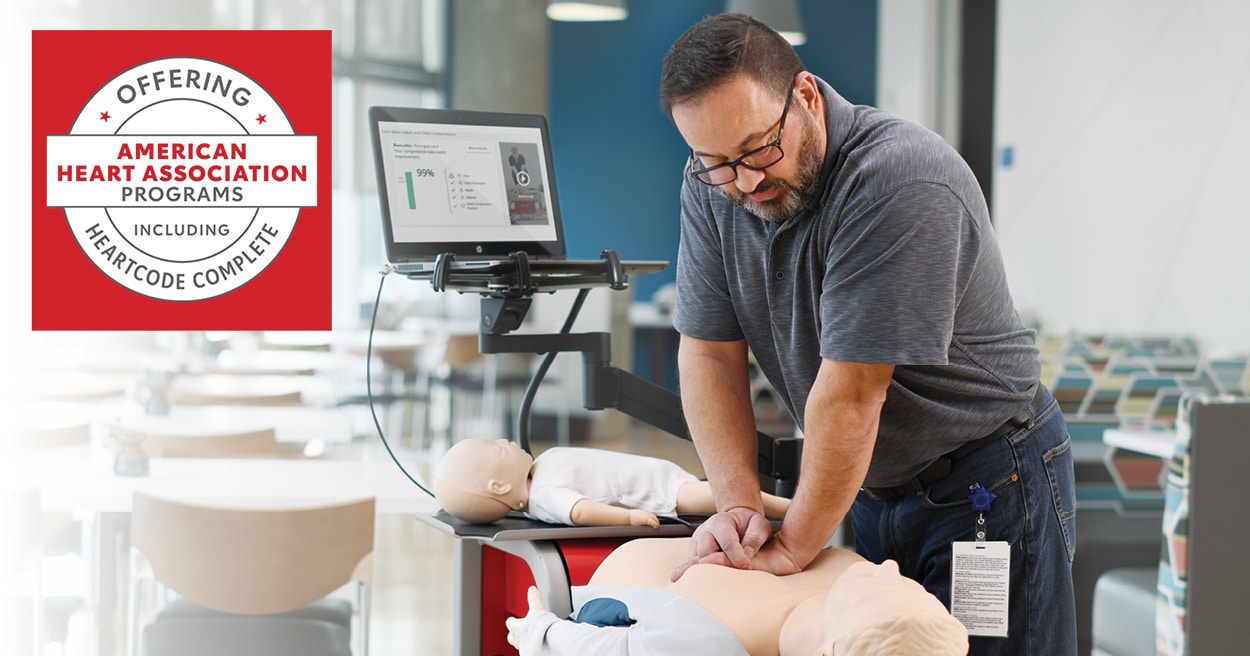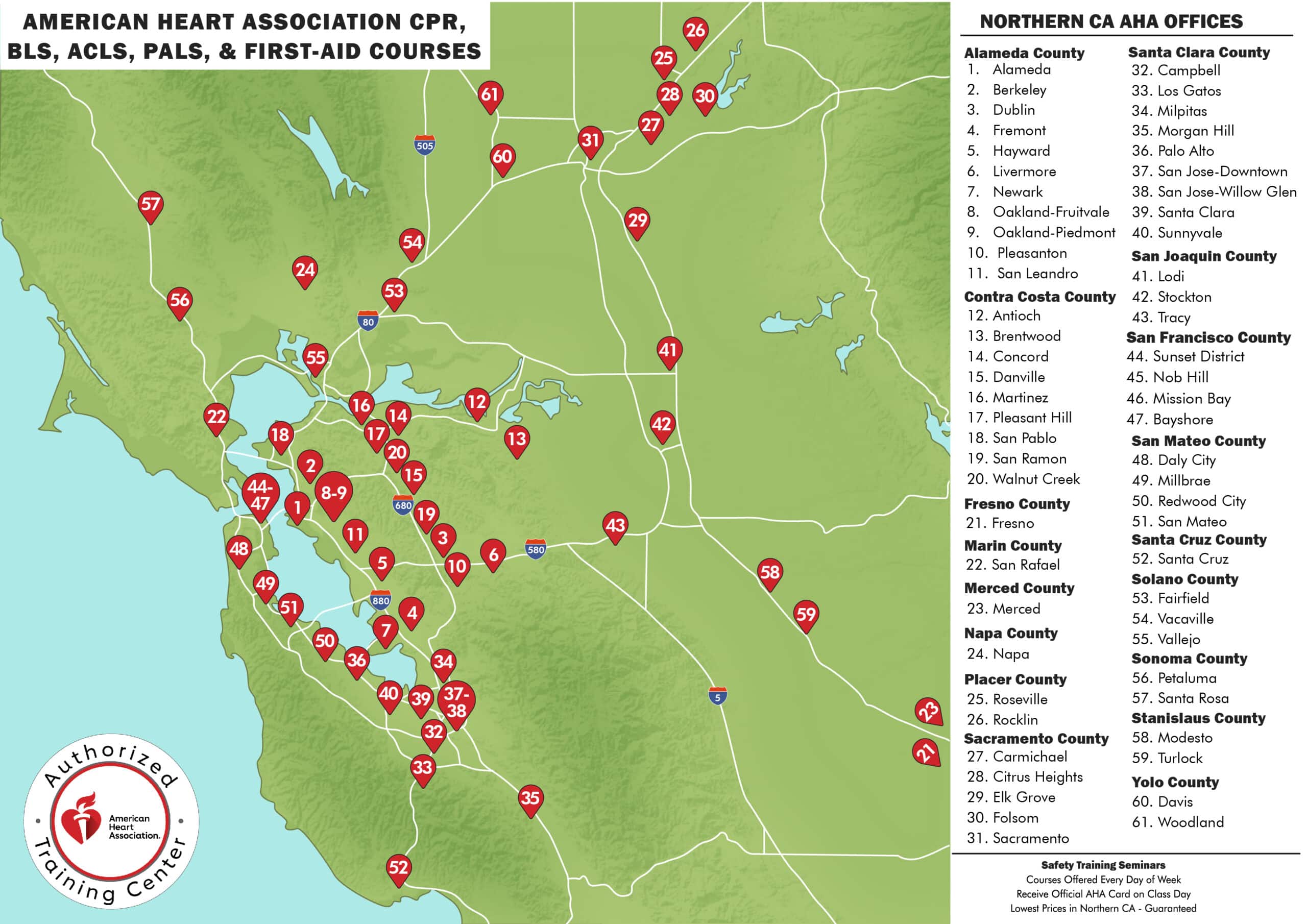American Heart Association© ACLS Certification Classes in Stockton

American Heart Association© ACLS
Course Name: ACLS Advanced Cardiac Life Support (Initial or Renewal)
Online Course Length: 3-4 hours (At your home.)
Skills Testing: 40 minutes (At one of our over 60 ACLS testing sites.)
Price: $290 (This includes the online ACLS course, skills testing, and card.)
Certification: American Heart Association© ACLS certification card.
When: ACLS classes are offered Monday – Sunday from 7 am to 6 pm
Card Issuance: You will receive the AHA ACLS card on the day of class.
Add ons available: BLS, PALS, First-aid, Opioid, or Bloodborne Pathogens
Lowest Prices in Stockton Guaranteed: Backed by price matching.
View ACLS Courses in Stockton & Other Cities Near You
Store locator is loading from StoreRocket Store Locator App..

American Heart Association ACLS Classes in Stockton: Enhancing Emergency Response
Advanced Cardiovascular Life Support (ACLS) classes offered by the American Heart Association (AHA) in Stockton, California, provide healthcare professionals with essential skills and knowledge to manage cardiac emergencies effectively. These classes go beyond basic life support (BLS) training, focusing on advanced interventions and team dynamics crucial for improving patient outcomes in cardiac arrest and other cardiovascular emergencies. This article explores the significance of ACLS training, the offerings of the American Heart Association in Stockton, and the impact these classes have on healthcare professionals and patient care in the community.
The Importance of ACLS Training
Cardiovascular emergencies, such as cardiac arrest, stroke, and acute coronary syndromes, require immediate and coordinated care. ACLS training equips healthcare providers with the ability to recognize and intervene in these critical situations effectively. Participants learn to interpret electrocardiograms (ECGs), manage airways, administer medications, and coordinate care as part of a resuscitation team.
Timely and proficient application of ACLS protocols is crucial for improving survival rates and reducing the risk of complications associated with cardiac emergencies. By enhancing the skills and confidence of healthcare providers, ACLS training contributes to the overall quality of care delivered in emergency departments, intensive care units, and pre-hospital settings.
The American Heart Association’s Commitment to Excellence
As a leader in cardiovascular research, education, and advocacy, the American Heart Association is dedicated to improving cardiovascular health and reducing the impact of heart disease and stroke. In Stockton, the AHA collaborates with healthcare facilities, educational institutions, and professional organizations to offer ACLS classes that meet the needs of healthcare providers across specialties.
The AHA’s ACLS curriculum is evidence-based and regularly updated to reflect the latest guidelines and best practices in cardiovascular care. Certified ACLS instructors lead interactive and hands-on training sessions, ensuring that participants gain the skills and confidence to apply their knowledge in real-world scenarios. Additionally, the AHA emphasizes the importance of continuous quality improvement, providing resources and support for ongoing skill development and knowledge retention.
Comprehensive Offerings of ACLS Classes in Stockton
ACLS classes offered by the American Heart Association in Stockton cater to healthcare providers at various stages of their careers, from novice clinicians to experienced practitioners seeking recertification. The curriculum covers a wide range of topics, including the recognition and treatment of cardiac rhythms, pharmacology, airway management, and post-cardiac arrest care.
Participants engage in interactive case-based simulations and hands-on practice sessions to reinforce key concepts and enhance clinical decision-making skills. The AHA’s ACLS classes also emphasize effective communication and teamwork, essential for managing complex emergencies in a dynamic healthcare environment.
Impact on Healthcare Professionals and Patient Care
ACLS training has a profound impact on healthcare professionals, enhancing their ability to provide high-quality care in cardiovascular emergencies. By equipping healthcare providers with advanced skills and knowledge, ACLS classes improve confidence and competence, leading to better patient outcomes and reduced morbidity and mortality rates.
Furthermore, ACLS-trained professionals serve as valuable resources within their organizations, contributing to a culture of excellence and continuous learning. As more healthcare providers in Stockton undergo ACLS training, the community’s capacity to respond to cardiac emergencies grows stronger, resulting in enhanced patient care and improved survival rates.
Conclusion
In Stockton, California, American Heart Association ACLS classes play a crucial role in advancing cardiovascular care and improving patient outcomes. By providing healthcare providers with the knowledge and skills necessary to manage complex cardiac emergencies, these classes enhance the quality and effectiveness of care delivery across the community. Through collaboration, education, and commitment to excellence, the AHA and its partners in Stockton strive to empower healthcare professionals with the tools they need to save lives and promote cardiovascular health and well-being.
FAQs
Who can benefit from ACLS classes in Stockton?
ACLS classes are primarily designed for healthcare professionals, including physicians, nurses, paramedics, and other allied healthcare providers who are involved in the management of cardiac emergencies.
How long does it take to complete ACLS certification training?
The duration of ACLS certification training varies depending on the specific course provider and format. Typically, ACLS certification courses consist of both didactic instruction and hands-on skills practice and can range from one to two days.
Is ACLS certification recognized nationwide?
Yes, ACLS certification obtained in Stockton is recognized nationwide and is widely accepted by healthcare organizations, employers, and regulatory bodies across the United States.
